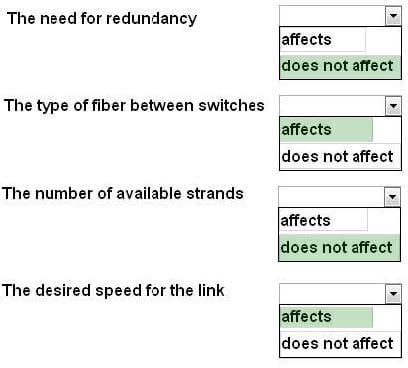HP HP0-Y50 dumps - 100% Pass Guarantee!
Vendor: HP
Certifications: HP ASE
Exam Name: Architecting HP FlexNetwork Solutions
Exam Code: HP0-Y50
Total Questions: 101 Q&As
Last Updated: Mar 12, 2025
Note: Product instant download. Please sign in and click My account to download your product.

- Q&As Identical to the VCE Product
- Windows, Mac, Linux, Mobile Phone
- Printable PDF without Watermark
- Instant Download Access
- Download Free PDF Demo
- Includes 365 Days of Free Updates

VCE
- Q&As Identical to the PDF Product
- Windows Only
- Simulates a Real Exam Environment
- Review Test History and Performance
- Instant Download Access
- Includes 365 Days of Free Updates
HP HP0-Y50 Last Month Results
 97.9% Pass Rate
97.9% Pass Rate 365 Days Free Update
365 Days Free Update Verified By Professional IT Experts
Verified By Professional IT Experts 24/7 Live Support
24/7 Live Support Instant Download PDF&VCE
Instant Download PDF&VCE 3 Days Preparation Before Test
3 Days Preparation Before Test 18 Years Experience
18 Years Experience 6000+ IT Exam Dumps
6000+ IT Exam Dumps 100% Safe Shopping Experience
100% Safe Shopping Experience
HP0-Y50 Q&A's Detail
| Exam Code: | HP0-Y50 |
| Total Questions: | 101 |
CertBus Has the Latest HP0-Y50 Exam Dumps in Both PDF and VCE Format
- HP_certbus_HP0-Y50_by_D-Ash_98.pdf
- 253.94 KB
- HP_certbus_HP0-Y50_by_gattuso_94.pdf
- 318.2 KB
- HP_certbus_HP0-Y50_by_Secret_93.pdf
- 245.79 KB
- HP_certbus_HP0-Y50_by_Sufyan_Ehsan_81.pdf
- 245.56 KB
- HP_certbus_HP0-Y50_by_AGH_94.pdf
- 257.55 KB
- HP_certbus_HP0-Y50_by_Ali_Raza_99.pdf
- 282.21 KB
HP0-Y50 Online Practice Questions and Answers
HOTSPOT
A network is choosing transceivers for switch-to-switch fiber links. Which factor affects the architect's choice?
Hot Area:
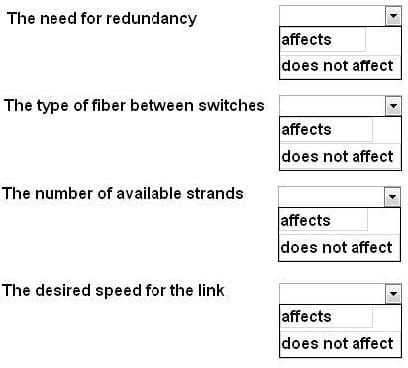
A network architect has designed a two-tier topology for the campus LAN and is planning to implement routing at the core. Which requirement might cause the network architect to consider implementing routing at the access layer?
A. Employees in different VLANs need to use collaboration applications to share high- resolution graphic files
B. The solution must support an isolated VLAN for wired guest devices
C. Employees need to be placed in dynamic VLANs, assigned by a RADIUS server in identity, so that network managers can manage the solution more easily
D. The customer has an HP Unified Wired-WLAN solution, and wireless users need to roam seamlessly across the site
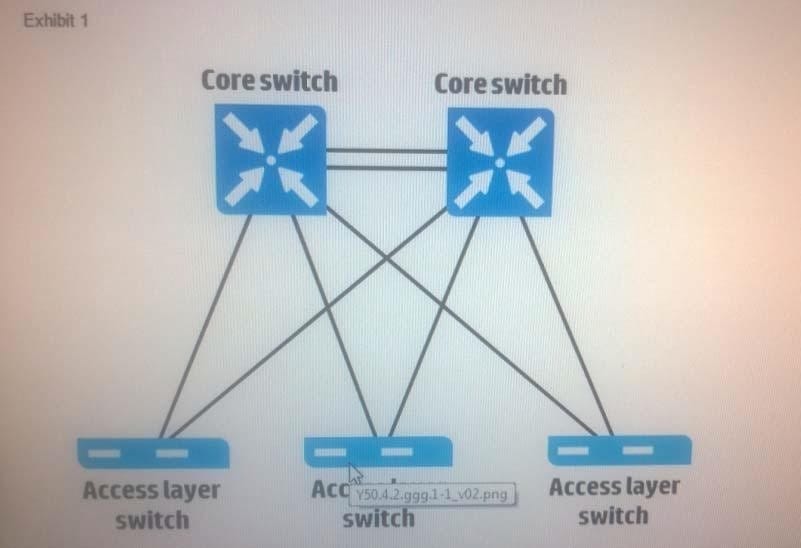
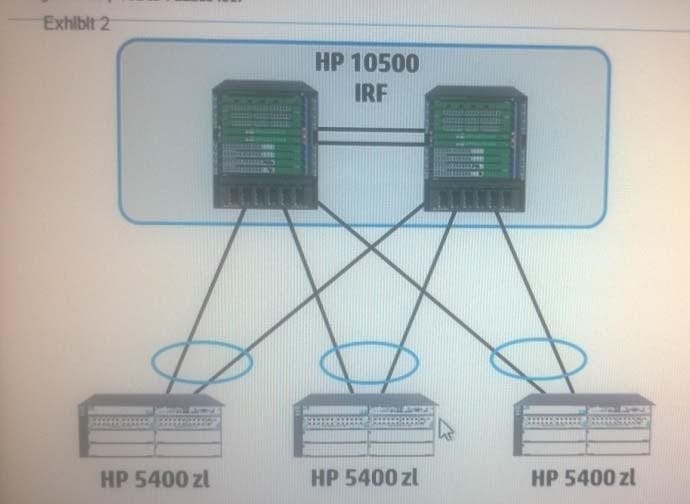
A customer has an existing solution, which is shown in Exhibit 1. (The solution actually includes more access layer switches than shown.) In the existing solution, each access layer switch routes traffic.
A network architect is proposing the HP FlexCampus solution shown in Exhibit 2. In this proposed solution, the core Intelligent Resilient Framework (IRF) virtual switch routes traffic but the access layer switches do not. The customer links that
in the existing solution if an access layer uplink fails, failover occurs in less than a second.
The customer also likes that the existing solution does not require Virtual Router Redundancy Protocol (VRRP).
What should the architect tell the customer about the benefits of the proposed solution?
A. Although the solution offers slower failover for the access layer uplinks, it is simpler and eliminates VRRP.
B. STP eliminates the loops on the access layer uplinks and handles failover for them, which speeds convergence.
C. Failover for an access layer uplink occurs in milliseconds, and router redundancy does not require VRRP.
D. IRF handles loop elimination and link failover, which lets VRRP handle router redundancy more efficiently.
Refer to the exhibit.
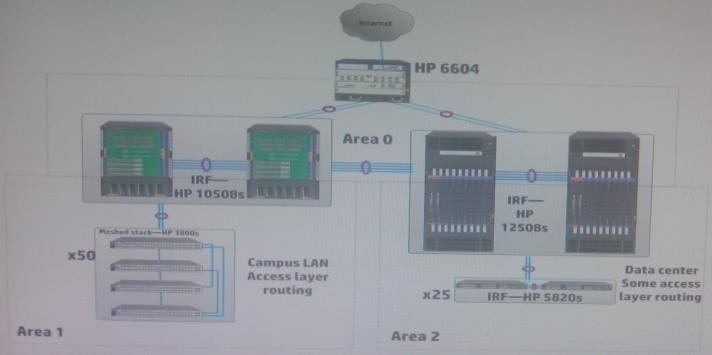
A network architect is proposing an HP 6600 series router at the core of this enterprise customer network. The router runs Border Gateway Protocol (BGP) and announces the customer networks to the internet service provider (ISP). The router also runs Open Shortest Path First (OSPF) to communicate with the rest of the customer network.
What is an appropriate method for the HP 6604 router to advertise routes to the internet to the other routing switches?
A. The route should redistribute BGP routes OSPF. Areas 1 and 2 should be configured as stub areas to filter out the external routes
B. The router should advertise BGP routes into OSPF but filter out all routes except the private network that belongs to the customer
C. The router should redistribute BGP routes into OSPF. The Area Border Routes (ABRs) should summarize those routes for advertisement in areas 1 and 2
D. The router should advertise a default route as an Autonomous System Router (ASBR) summary to the other routing devices in area 0
Refer to the exhibit.
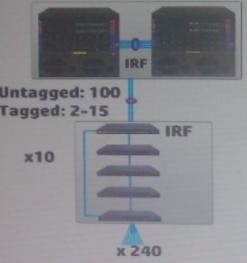
A network architect is designing the logical topology for a campus LAN networking solution. The customer requires support for 2400 edge ports, which is provided by 10 intelligent Resilient Framework (IRF) groups at the access layer. This customer does not have a wireless network nor anticipants adding one in the next two years. However, the customer does want to authenticate users with 802.1X and use the network RADIUS server to divide users from different groups into different VLANs. The customer has three user groups, each of which includes between 600 and 900 users.
Additionally, the customer understands that the RADIUS server will require several policies but wants to keep these policies as simple and easy to maintain as possible.
How can the network architect ensure that the solution meets the customer needs and also follows best practice?
A. Assign a /23 subnet to each VLAN so that the VLAN can accommodate the required number of users, even if users connect multiple devices
B. Plan a different VLAN ID and subnet address for each user group on each access layer IRF group. Either core or access layer routing will work for this solution
C. Use access layer routing. Assign a different subnet to VLAN2 on one access layer IRF group then the VLAN2 on the another access layer group
D. Plan a solution for designing dissolvable agents to the endpoints so that they can complete 802.1X authentication seamlessly
Add Comments
Success Stories
- Macedonia
- Mace
- Mar 20, 2025
- Rating: 4.5 / 5.0
This dumps is valid. I just pass the exam with it. The answers are accurate.Recommend.
- Indonesia
- Alexa
- Mar 20, 2025
- Rating: 4.2 / 5.0
![]()
Great dumps! I achieved high score with the help of this dumps, I will continue use this dumps and introduce it to others.
- India
- zuher
- Mar 19, 2025
- Rating: 4.9 / 5.0
![]()
the content update quickly, there are many new questions in this dumps. thanks very much.
- Australia
- Jordan
- Mar 18, 2025
- Rating: 4.8 / 5.0
![]()
The version is complete and accurate. The most important is that this dumps update quickly and there are many new questions . So I felt confident in exam. Recommend.
- India
- John
- Mar 18, 2025
- Rating: 4.9 / 5.0
![]()
hi guys I had my exam yesterday and passed. It is really a good dumps. Thanks very much.
- United Kingdom
- Carlos
- Mar 18, 2025
- Rating: 4.9 / 5.0
![]()
I purchased the dumps one month ago and I learned a lot from the dumps. I will attend the exam tomorrow, I feel very confident now. Good luck to me.
- Philippines
- Zotac
- Mar 17, 2025
- Rating: 4.7 / 5.0
![]()
I'm very happy that I have passed the HP0-Y50 exam with high score. I will share this good dumps with my friend. You can trust on it.
- Greece
- Ramon
- Mar 14, 2025
- Rating: 4.9 / 5.0
![]()
The answers are accurate. Well you should notice some of the questions are slightly changed. Be careful.
- United Kingdom
- zill
- Mar 14, 2025
- Rating: 4.4 / 5.0
![]()
With the help of these dumps, I passed the HP0-Y50 exam perfectly. Thanks a lot.
- United States
- Quentin
- Mar 14, 2025
- Rating: 4.4 / 5.0
![]()
Very good HP0-Y50 dumps, take full use of it, you will pass the exam just like me.


 Printable PDF
Printable PDF